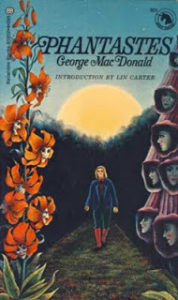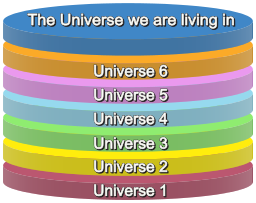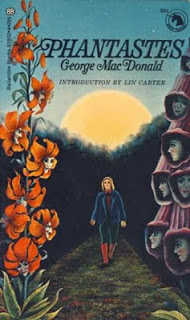Truth And Story: A Look At The Multiverse
 Recent successful series such as Stephen Lawhead’s Bright Empires Series (The Skin Map, The Bone House, The Spirit Well, The Shadow Lamp) utilize one of the most common staples of Christian speculative fiction: parallel worlds. The idea of such parallel worlds is not a new one. George MacDonald in Phantastes used such a device. His writing influenced C. S. Lewis to develop his stories of a land called Narnia, accessible through a wardrobe. MacDonald’s writing also influenced Tolkien, Chesterton, and Mark Twain.
Recent successful series such as Stephen Lawhead’s Bright Empires Series (The Skin Map, The Bone House, The Spirit Well, The Shadow Lamp) utilize one of the most common staples of Christian speculative fiction: parallel worlds. The idea of such parallel worlds is not a new one. George MacDonald in Phantastes used such a device. His writing influenced C. S. Lewis to develop his stories of a land called Narnia, accessible through a wardrobe. MacDonald’s writing also influenced Tolkien, Chesterton, and Mark Twain.
The current works of Christian speculative fiction (CSF) authors are rich with this idea. I asked myself why. Why has the parallel universe/world literary device become so popular in CSF? And, the possibility of such universes/worlds raises even more significant questions for CSF authors and readers. If such universes exist, what is God’s role in those universes? Does God have a different plan for His creation in other universes? Does sin exist there? If so, how would God handle the atonement issue in another universe? More importantly, for any well-informed Christian, is this central question: Does the presence of a multiverse do away with the necessity of a Creator God? After all, with an infinite number of universes, ours just might be the one universe in which, purely by chance, life has developed and we really don’t need a God to bring it all into existence!
Don’t underestimate that last concept. The multiverse is the latest attempt by naturalists (scientists and philosophers who base their worldview on Darwinism and materialism) to kill God. Stephen Hawking and Lawrence Krauss have both written books in recent years that show how our universe came into existence purely by chance, and there is no need for an Uncaused Cause! Why would they spend so much time and effort to disprove God if God doesn’t exist?
Wait a minute, Bruce. You are talking some mumbo jumbo here. This is a post for CSF authors and readers. You are veering into the territory of hard science and philosophy and apologetics. What does that have to do with fiction?
Our own Rebecca Luella Miller had this to say about CSF (emphasis mine):
Christian speculative fiction is written by a Christian, but not everything written by Christians qualifies as ‘Christian.’ Rather some element of the story needs to be distinctly connected with what it means to be Christian. Perhaps the characters are predominantly Christian. The plot might revolve around something distinctly Christian. Or the themes may relate in a specific way to the Christian faith.
And here is the point that separates Christian fiction, I believe, from all other fiction. Christian fiction speaks the truth about God. Other fiction can speak the truth about morals or the way the world works or what makes a person love or hate or live on the edge. Other fiction might be silent about God. Other fiction might speak a lie (though undoubtedly the author believes that what he’s written is true) about any of these things. Only Christian fiction speaks the truth about God.
Ah, there is that pesky word, truth. Wait a minute, more than that–Truth with a capital T. And, to speak to the existence of a transcendent Truth in today’s postmodern, relativistic society is very dangerous for the speaker. But, isn’t that our mission as Christian storytellers? Aren’t we supposed to convey the Truth through our story? And shouldn’t our story be part of the big Story God is unfolding around us (also known as the meta-narrative)? Otherwise, what makes us any different from Stephen King or George R. R. Martin (Game of Thrones) or any current science fiction writer? I’ll tell you. We, alone, have Hope, Purpose, and Destiny on our side and our stories MUST convey the Truth contained in the Christian worldview. Can we do that by using the foundational concept of the multiverse and not betray our God?
My suggestion is a radical idea. The possible existence of a multiverse does NOT rule out the existence of God. In fact, the multiverse is a very powerful evidence FOR the God of the Bible. Now, understand that the existence and nature of the multiverse is purely theoretical since we can never, according to science, prove the existence of a multiverse. But we have to understand what kind of creature a multiverse is. Let’s define the different types of multiverses that are proposed by physicists.
According to Jeff Zweerink of the organization Reasons to Believe, (from his booklet, “Who’s Afraid of the Multiverse?”) there are four accepted types of multiverses that MIGHT exist:
Level I: There exist regions, beyond our observable universe but similar in size, which exhibit the same laws of physics but start with different initial conditions. Basically, this affirms that the universe does not end just beyond the most distant regions we can observe. The only controversial issue at this level pertains to the size of the region beyond our observable universe. If the universe is closed, the geometry of the observable universe (very close to flat) provides a minimum size for the whole universe of a few thousand times our observable universe. However, if the current formulations of how inflation works contain any truth, these models generically predict that the spatial extent of the universe is infinite.
Level II: There exist other bubble universes that obey the same equations of physics but with different fundamental constants, particles, and dimensionality. This level differs from Level I in that many universes (not just the one where we reside) actually exist inside their own inflating bubbles. Whereas all the regions outside our observable universe in Level I obey the same laws of physics with the same fundamental constants, each Level II bubble universe obeys the same laws of physics but the fundamental constants assume different values than those from our universe.
Level III: This level corresponds to the many-worlds interpretation of quantum mechanics put forth by Hugh Everett. The relevant feature of this level pertains to the physical basis for quantum events. When determining what happens at the quantum level, the best one can do is assign a probability for each of multiple different outcomes. Basically, the many-worlds interpretation says that for each quantum event, a “history” or “world” actually exists where each of the possible outcomes is realized.
Level IV: This level posits that any mathematically coherent structure defines a physical reality. Obviously, this leads to universes with completely different laws of physics. No Level V can exist because Level IV encompasses all possibilities.
 Okay, so try and wrap your brains around those explanations. More than likely, we do exist in a Level I multiverse which simply means that the observable universe is smaller than the actually universe since light traveling from the beginning of time has been outrun by the expansion of the universe. However, most parallel world stories utilize a form of Level III with the basic tenet being that at some point, there is a branching of realities creating an alternate version of our universe that has diverged from our reality. And, many CSF stories utilize a Level II universe where the laws of physics are the same as ours. As to Level IV, it’s pretty far out there in concept so we won’t worry about it. Suffice it to say, most CSF alternate world stories use a Level II or Level III multiverse.
Okay, so try and wrap your brains around those explanations. More than likely, we do exist in a Level I multiverse which simply means that the observable universe is smaller than the actually universe since light traveling from the beginning of time has been outrun by the expansion of the universe. However, most parallel world stories utilize a form of Level III with the basic tenet being that at some point, there is a branching of realities creating an alternate version of our universe that has diverged from our reality. And, many CSF stories utilize a Level II universe where the laws of physics are the same as ours. As to Level IV, it’s pretty far out there in concept so we won’t worry about it. Suffice it to say, most CSF alternate world stories use a Level II or Level III multiverse.
So, does the multiverse disprove the existence of God? Zweerink has this to say:
Generally, the “cosmological argument” is articulated like this:
. Whatever begins to exist has a cause.
. The universe began to exist.
. Therefore, the universe had a cause.The relatively recent discovery of the universe’s beginning surprised many scientists because they assumed the universe was eternal. In fact, the singular beginning implied by big bang cosmology readily supports the Christian doctrine of creation ex nihilo.
And here is the most important question. Does the multiverse model eliminate the beginning with a capital B?
The multiverse argues that creation existed prior to the big bang. While the details are too specific to include here, all viable multiverse models still require a beginning! Although these models make the issue more complex and nuanced, the fundamental Christian doctrine of creation ex nihilo still stands on firm ground. In fact, research into multiverse alternatives to a single universe has made the case for a beginning even more robust than big bang cosmology alone.
Bottom Line: Go ahead and write about those alternate worlds and universes. But, be careful. As authors of CSF conveying the Truth in our stories, we must be extremely canny with world building. To stray away from the Truth of historical Christianity’s tenets, even in a parallel world, would give credence to a universal theology. Here, we must be very, very careful. After all, a prudent study of early church heresies reveals just this type of fiction: tweaking the Truth into a version that suits our human thought processes and needs.
We can indulge in the possibilities of multiple worlds and universes, but let us be very careful with the worlds we build. C. S. Lewis’ Narnia is rich with the foundational concepts of Christian theism. And, we can do this, too. Let us remember that in writing our stories about parallel worlds and alternate universes, we are appealing to a secular audience. By imbedding the values of Christian theism in our stories, we bring Truth to their awareness. This is our calling in Christian Speculative Fiction as Becky stated above. Above all else, we must tell the Truth!
I encourage all authors and readers to develop a firm foundation in the defense of the Christian faith: apologetics. I have a list of resources on my website under the Apologetics tab for using apologetics in fiction. I list some very good starting points. In fact, I am putting together a book for Christian fiction authors of questions and answers from apologetics. I can use your help in putting it together. To help, submit those nagging questions that keep you awake at night. Or, if you are an author and you are stymied as to handle an issue of science, history, or philosophy, send me your question. But, be patient. I may not answer right away and the emphasis here is on compiling a list of the general concepts we need as authors of Christian speculative fiction. Just go to my website and the Apologetics’ tab and fill out the comment form in the Apologetics tab. Send me your questions. I’ll try my best to point you in the right direction, and who knows, I might get a Fiction Apologetics website up and running.
Just remember, the world thinks of us as ignorant, superstitious fools. Prove them wrong! Be informed. Do your research. Write the Truth! And, don’t be afraid of the multiverse!
– – – – –
 Bruce Hennigan grew up in Northwest Louisiana and became a physician practicing in the field of radiology. He was a church drama director for fifteen years and wrote over 150 plays. He is a certified apologist–one who defends the truthfulness of the Christian faith–and speaks on this topic on a regular basis.
Bruce Hennigan grew up in Northwest Louisiana and became a physician practicing in the field of radiology. He was a church drama director for fifteen years and wrote over 150 plays. He is a certified apologist–one who defends the truthfulness of the Christian faith–and speaks on this topic on a regular basis.
Hennigan co-authored Conquering Depression: A Thirty Day Plan to Finding Happiness with Mark Sutton, published by B & H Publishing in 2001. An updated version, Hope Again: A 30 Day Plan for Conquering Depression, will be released by B&H in September, 2014. He is also the author of the supernatural thriller novels in the Chronicles of Jonathan Steel series–The 13th Demon: Altar of the Spiral Eye; The 12th Demon: Mark of the Wolf Dragon; and The 11th Demon: The Ark of Chaos.
He has two grown children and lives in Shreveport with his wife, Sherry. For more information, check out his website. To learn more about the Chronicles of Jonathan Steel, visit the series website.









































Wat? I’ve derped around in more atheistic corners of the Internet, but I’ve yet to hear that multiverse theory is the New, ImprovedTM way of disproving God. They think this universe alone offers enough evidence for that.
Also, the site lists Rebecca as author. I’m guessing she just published it here, but at least Bruce’s bio is at the bottom, though looking a bit unformatted, compared with the other bios.
But anyway, on to literary argle-bargle. MacDonald in Phantasies borrows a lot from the idea of Faerie or Fairy Land (particularly Spencer’s Faerie Queene, flavored with the Romantics), and so does that mean that Fairy Land is the proto-multiverse theory? It was pretty well parallel in structure to the human world, though it had different laws and rules (granted, some of those were cultural, but some seemed to be physics-ish related. Vaguely). Honestly, this vague idea of multiverse has been around in literature longer than in modern science. I don’t think we’re in danger of being challenged by scientists, because literature and science are very different genres, so to speak.
C. S. Lewis is an example of a literary apologist. He wrote fiction. And, he wrote excellent works on apologetics in which he discusses science. And, it is not the scientists I fear. It is the philosophers, the naturalists who base their philosophy ON science. Naturalism is winning the battle of ideas in modern society. Who else can better engage in that battle than the author? Where do ideas come from? From stories! Literature is our foundation for promoting and exploring ideas. I think the danger is not necessarily from science, but the philosophy of science hiding behind the smoke screen of modernity.
True, the idea of alternate worlds has been around for as long as man can tell stories. But, the multiverse is a solid, well accepted, modern scientific concept based on theories that is gaining acceptance as reality. And, as I mentioned above, my fear is that the more we accept these “ideas” based on “sound science” and their influence in our society, the more we will see naturalism eclipsing theism. Literature is a tool to challenge these philosophies.
I think you’re jumping at shadows. Literary naturalism has been around since Jack London and Stephen Crane and Frank Norris. Heck, Calvinists could be considered naturalists because they hold with predestination, which is a fancy spiritual word for predeterminism, i.e., a solid portion of naturalism. Though secular naturalism was based on genetics and social class and not so much on whether/how God rigs your game. You’re using “naturalism” as a scare-word rather than as something to be discussed.
And Lewis is one of the rare apologists I like, but he spent less time apologizing and more time philosophizing. Also, he was at least familiar with academia’s train of thought. I think you need to spend some time on atheist blogs to figure out what they talk about and get a better idea of what they actually believe.
Definition of naturalism I am using:
doctrine rejecting spiritual explanations of world: a system of thought that rejects all spiritual and supernatural explanations of the world and holds that science is the sole basis of what can be known
Thanks for your comments.
Technically that’s materialism (in the sense of the material vs immaterial) and/or physicalism.
Thanks so much for an intriguing post … a lot to think about!
Notleia:
The multiverse brings Darwinian thinking into cosmology. How is it that the universe is so precisely structured for life? This is a question that makes atheists uncomfortable. The multiverse idea allows adherents to say: “There are many universes – most are sterile – but of course we would have to be in one that is suited for life.”
…………………….Okay, then. Still haven’t heard it directly from atheists.
Peter Woit on Lawrence Krauss’ use of the multiverse as an argument against God(http://christian-apologetics.org/2012/peter-woit-on-the-multiverse-as-a-weapon-against-religion/):
It’s the first I’ve heard of this guy. This is only a semi-educated guess, but I don’t think he’s terribly popular. Most of the atheist arguments I’ve heard are pretty Earth-centric.
In any case, I don’t think multiverse is a battle to pick. You still have the basic headlock of “blah-blah-science” and “blah-blah-Creator.” Not any more of a decisive throwdown than any other topic in the arena of science/religion headbutting.
That is exactly the point I made in my post. The multiverse is another way to avoid the uniqueness of our universe — its orderliness, its structure, is design. The “teleological” argument from design is one of the most troublesome to those who question the existence of a creator God. As you point out, an infinite number of parallel universes allows ours to be the exception to the rule!
I have been reading Lawhead’s Bright Empires series with a bit of a troubled mind. I know Lawhead is a Christian. But why is he running with atheist Stephen Hawking’s favorite apology for evolution’s very low odds? As you mentioned, that apology says that though the odds of complex life occurring by accident are extremely slim, if you multiply earth and its universe by an infinite number of possible universes, sooner or later you’ll find a universe where evolution is actually probable.
I think Lawhead has said he finds the multiverse idea to be a fun one to play with. And so his series is fun to read. Still I am a bit troubled by it.
I agree with your assertion. The problem I have with “playing around” with the multiverse in Christian fiction is the danger of misleading those who read our fiction into thinking we agree with Darwinism and naturalism. That is why I think we should be very careful. How do we do that? It takes more than just a token understanding of scientific apologetics to get your world building right. C. S. Lewis did it in Narnia and Perelandra. But we must be cautious with just “playing” around. I found the Bright Empires series intriguing so far but I also sense a great many ideas and concepts that could be construed as New Age or Eastern philosophy in nature. Maybe I am over reading the intent of the author, but I too am, at times troubled and this is why I decided to share my thoughts in this post.
I don’t generally care about the science of other universes, unless something supposedly set in our world violates our laws of science.
*sigh* I keep coming back to the thought that “Christian fiction” is simply 1) fiction written by a Christian and/or 2) fiction written for Christians. A man sculpts a beautiful eagle. Is it Christian art because the man who sculpted it is Christian? Does it become Christian art if a non-Christian sculpts it and puts a Bible verse on it and sells it to a Christian? What makes the sculpted eagle a Christian work of art? If the eagle is stylized in some way so that it is less realistic and more interpretive, is it any less “true”, any less an eagle?
Although it’s an admirable and noble goal to write fiction that reflects the Truth, and I personally strive for that, I do get tired of the number of discussions we have about how it has to look one way or another, or contain this or that, or portray God a certain way or portray the Truth accurately. Just sculpt the bird! Or, in the case of speculative fiction, sculpt the griffon!
It’s fiction, folks. Yes, strive to portray things from a worldview that doesn’t detract from God or His work in the heart of your reader. But most of all, write the story that’s inside you to the best of your ability. It’s your story.
We are imperfect humans. None of us sees God clearly and accurately. We see Him through a glass darkly. We bring our filters to our reading of the Scriptures. Our writing comes out through the filter of our limited understanding. We may (consciously or unconsciously) use our storytelling to process and think through our understanding of the world and of God and of the meaning of human existence. Which means, we’ll make mistakes. Our understanding will grow over time. So our stories will never perfectly portray Him or His ways. And that’s okay. God allows for that.
To me, there’s a place for exhortation to stay true to the Truth in our art, but also for couching such in terms of grace and the process of living in relationship with Him. Cautions like, “We can indulge in the possibilities of multiple worlds and universes, but let us be very careful with the worlds we build… Above all else, we must tell the Truth!” (in this article and another recent one) start to feel tiresome and heavy. Like shackles where God has given us freedom. “Above all else”? I guess it’s the wording, the ultimatums, that tire me.
Ah, well. I suppose that’s okay, too. If the authors of these articles are feeling the need to preach this message, let them preach. Maybe this is exactly what some folks need to hear. It’s not that I disagree with the principle. I’m just sensitive to the human tendency to make and glorify rules where relationship should be in ascendance. It bugs me.
I don’t want to hear an admonition about how I have to be careful that my fiction tells the Truth (with an unsaid implication that if my story strays from the truth boundaries of the article author’s understanding, or some other arbitrary doctrinal standard, then I’m disobeying God).
I want to hear an admonition to draw close to God and stay in His Word, to steep myself in His Presence so that my writing drips and oozes with His anointing. I want to hear a reminder and encouragement that my words have influence and they can have mighty power for good when I’m writing what He gives me to write. Yes, to be reminded that this is a weighty responsibility, but also to be uplifted by the fact that He dwells in us and will show us the way and give us the grace needed to do it.
I want to be reminded that there are great and mighty things that we do not know, but that God desires to reveal to those who seek Him. I want to be encouraged that I am made in the image of God, and like Him, I have the ability and the desire to create and imagine new things. When I’m sculpting a griffon, I don’t want to be told how it should stay true to the eagle or the lion. I want to create the most fantastic griffon that my imagination, guided by the infinitely-creative Holy Spirit, can come up with. Fearlessly. Boldly.
Thanks for the chance to discuss. Again, it’s not that I disagree with the importance of the Truth. I just so keenly feel the need to press beyond the boundaries that Christian culture sets for us as fiction writers, and even outside the box in which mainstream Christianity tends to keep God. I suppose it’s because in my experience, the real Truth is outside the comfort zone of most Christians.
Teddi, did you see my clarifications in the discussion of that previous column about 1) personal motivations, 2) the difference between actively in fiction subverting God’s nature and artistically imaginating a different world?
If you merely want to enjoy make great stories/art/whatever — either explicitly or implicitly for God’s glory — then I promise: no one here has any beef with thee. 😀
It helps me to be more accepting that this guy’s an apologist, and it might just be that he’s best at expressing himself in the form of debate and not much practiced at anything else — you know, like a discussion where you actually pay attention to what the other person says instead of rehearsing your canned rebuttals.
*checks “take cheap shot at someone on the Internet” off to-do list*
But yeah, I’m not necessarily a fan of apologists because a large portion of the ones I’ve been exposed to are like the talking heads on Fox News that constantly interrupt and talk over each other.
I agree with you about most apologists. I was in a meeting of our local group of apologists and the discussion became so heady and so academic. I shouted everyone down and asked a simple question. “Why are you here?” The answers were somewhat disturbing and ultimately illuminating. I entered into the discipline of apologetics so I could defend Christianity to my scientific colleagues with rational, reasonable answers that showed the truthfulness of the Bible. To me, apologetics is a tool to fulfill 1 Peter 3 — always be prepared to give a reason for the hope that is within us. Unfortunately, we don’t live in Jerusalem anymore where Peter could preach to a crowd using the scriptures and win 5000. We live in Athens, where Paul has to resort to basing his testimony on the philosophy and science understood by his listeners. If you check out that account, most went away disinterested but a few were convinced and some said they wanted to hear more. My goal as an apologist is not to be a “talking head” but to be able to answer questions in such a way as to create a dialogue and have a civil conversation. It has worked for me. But, I guess I am the exception to the rule!
I think it would be a little simpler point. It seems so much energy is spent saying “Yes, it’s okay to like fantasy and science fiction,” and sometimes I feel it would be nice to assume people here are interested in both and don’t really need the justification to consume it.
Your point is well taken. I, too, want to write stories outside the Christian fiction box. Too often, we let the message rule at the expense of story. When the story is well written, well plotted, well constructed and the author is writing from a heart in tune with Christ, then the message will seep through. And sometimes, that is all we can hope for. If it is too obvious; if we raise Truth to a powerful weapon to pound our readers with, I agree we lose the battle. We come across as “preachy” as you said. The last thing I want to do is to be Preacy in my prose! Preaching belongs in a sermon, not in a novel. Stories can serve a preacher as part of a sermon. I have been asked to review far too many books where the message is so overpowering, I cannot finish reading the story. And, we have discussed this ad nauseum in this and other posts. I just thought it might be interesting and stimulating to look a the multiverse idea more closely. You can read some of the other posts and replies above to see where this could be “dangerous” and could lead one astray from the “Truth”. Thanks for the comments.
Interesting article. I’ve never heard this warning about using parallel worlds before. As long as the fundamentals of Truth are established within the story (to whatever degree), I don’t think the writer will be in any danger. The point is to write the best story possible.
For me personally, the danger in world building another place and time is I become the Creator of that world. And, I am a very poor reflection of God in that respect. I know I will mess it up. After reading the posts and replies to my article I sense that maybe I have a problem with world building myself. I don’t want to build a world that is so attractive, but ultimately misrepresents the Gospel. Recently, I used an analogy in my third book that was proposed by, I think and I’ll have to check on this, Paul Copan. In his proposal, he suggested when talking to others about the universality of religion — that is all roads lead to God– that Jesus is viewed very favorably in all major religions. He is elevated above the status of a mere man or good teacher, even in Islam. His suggestion, then, is “why not start with Jesus”? But, a reader responded and accused me of making Jesus a universal figure and diminishing His unique identity as one of the Trinity. That was never my intention. This happens, I think, more than we realize and it underscores the responsibility we carry as published authors to keep the “fundamentals” of the Truth straight in our own minds and anticipate how our words will be taken. True, we can’t please everyone, as comments to the post clearly illustrate. But, we should strive to be “gentle and respectful” to our readers as 1 Peter 3 commands. Thanks for the comments.
Biblically speaking, as we should always, the “multiverse” already exists, if you wish to call it that. The Word teaches there are at least three “verses” that we know of: what is called Heaven, what is called Hell (by various terms in scripture) and this present world in which we live. So the idea of being afraid of “multiverse” is not, to me, a major concern. The concern is, as the post author so ably demonstrates, remaining true to the Truth as it is revealed to us, both in our lives and in what we write. Well done.
P.S.
The three “verses” spoken of in scripture — these are the ones we KNOW. It does not mean there may be no others. “Infinite” may be pushing it, but I for one will be greatly surprised and perhaps not a little disappointed to learn that the “three is it.” Personally, I do definitely believe there are other worlds, places, “verses” if you wish to call them such. The three we know, do they exhaust the creativity, majesty and glory of God? (Even Hell does that — glorifies God — as an expression of divine judgment). Only three? This is it? I think not. I think…not….
Yes! I want to believe in other forms of existence, that the expression of the divine is not limited by our dim apprehension of our dingy world. I don’t know if I have enough faith to suspect that God really has created other worlds; I feel depressed enough about this one. But hearing the confirmation of this subjective need from a Biblical absolutist encourages me.
This is why I hope Ken Ham is wrong about his 6,000 years. I want to believe that God’s story is greater than that. But I could have better accepted Ham’s strict interpretation better if he would have admitted that somewhere, somehow, outside of our frame of reference, there really is infinite wonder and transcendent meaning. As Bill Nye said in the debate, that thing that was before Big Bang really is with us right now, and that is wonderful.
Walter Martin touches on this in his excellent work, “The Kingdom of the Occult” and outlines these other “dimensions”. As to the Ken Ham debate, let’s not even go there! These comments would never end. I always think about William Lane Craig’s invitation to debate Richard Dawkins. Dawkins refused and his own atheist colleagues vilified him for refusing. In other words, put your money where your mouth is, they said. When Craig went to London, he debated an empty chair!
As an apologist, and a published author, my gift is not debating. I find that debates tend to be sharply divided between the two sides and I wonder if anyone’s mind is ever truly changed. Just know that there are many more Christian apologists out there than Ken Ham who have alternate views of the age of the universe and the Biblical interpretation. Ken Ham does not represent all Christians nor does he represent all apologists. I could have given Bill Nye a short list of much better apologists to debate: Ravi Zacharias, Bill Craig, Hugh Ross, Frank Turek, or Stephen Meyers. Anyone of them would have made that debate much more interesting and more challenging for Bill Nye.
Let’s face it. Being a Christian by default makes us creationists. And, we have to move beyond our own bickering among ourselves about the age of the universe. Stephen Meyers made an excellent point in a conference in 2012. We are arguing about the age of the universe and the naturalists are laughing themselves silly. They have us fighting among ourselves while they win the battle for the intellectual mind of society. Instead, we should be asserting what we know is true: the universe has a Creator and it is the God of the Bible. And, we can know Him!
I wouldn’t worry about the multiverse idea because at heart, it requires just as much faith as believing in a God if not more. They key thing linking all the types is that they are nonobservable and unrepeatable almost by definition. Type 1’s are beyond the observable universe and always will be. Type 2’s are not only that, but are impossible to enter due to the differing physical constants; they’d be walled up to the point where possibly light itself couldn’t penetrate it.
Type 3’s are pure wishful thinking. It assumes that all choices are binary choices, and it would postulate an infinite multiverse. The thing is, apart from God nothing discrete is infinite without losing its meaning. A hotel with infinite rooms can’t exist as a real thing as opposed to a mathematical construct, and I don’t think choices can be expressed at a quantum level either. Type 4 is just whatever.
In any case, I think these all came about more as out-there theories to reflect the fact that the universe continually defies explanation. The math is off, and people keep trying to make it work. It’s not something strong enough to lose or gain faith over because we’re talking something that exists as at highly theoretical level and can never really be directly observed, only theorized as one way to explain certain mathematical irregularities in the universe.
I’d also point out that a literary multiverse is something completely different, especially in Christian fiction. Essentially most multiverses are treated as America was before the age of Columbus; a separate land with its own people and virtually impossible for people to access apart from miracle. More a convenient device than anything. Same with many worlds fiction; usually it’s just a coarse device to say “what if?”
You could have fun with it though, but it would really lead to heresy or something to assume a type three. One way would be universalism; if a new universe splits off with each decision, there is one universe somewhere where everyone becomes saved by freely accepting Christ’s sacrifice. At the end of time God could simply recall that quantum state without violating free will and “bam!” everyone is saved. Or that it would be wrong because human beings would suddenly become infinite too; an infinite number of D.M’s exist because in essence, the set of choices I have in my life are functionally infinite. It’s a smaller infinity than the set of all countable numbers, but still.
But these are thought experiments and not real things.
Thanks for the comments.
One last comment. Atheists do use science and literature to promote their “beliefs”. Here is an excerpt from an interview with Phillip Pullman:
“I’ve been surprised by how little criticism I’ve got. Harry Potter’s been taking all the flak. I’m a great fan of J.K. Rowling, but the people – mainly from America’s Bible Belt – who complain that Harry Potter promotes Satanism or witchcraft obviously haven’t got enough in their lives. Meanwhile, I’ve been flying under the radar, saying things that are far more subversive than anything poor old Harry has said. My books are about killing God.”
Note that he uses the multiverse in his books, therefore, he appeals to science and also note that he has an agenda — to kill God. And he is not alone.
Thanks to everyone for the comments both positive and critical. I welcome the chance to exchange ideas. For those of us who are Christians please remember 1 Peter 3: 15 — “but in your hearts honor Christ the Lord as holy, always being prepared to make a defense to anyone who asks you for a reason for the hope that is in you; yet do it with gentleness and respect,”